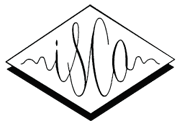Restoring degraded speech via a modified diffusion model
(longer introduction)
| Jianwei Zhang (Arizona State University, USA), Suren Jayasuriya (Arizona State University, USA), Visar Berisha (Arizona State University, USA) |
|---|
There are many deterministic mathematical operations (e.g. compression, clipping, downsampling) that degrade speech quality considerably. In this paper we introduce a neural network architecture, based on a modification of the DiffWave model, that aims to restore the original speech signal. DiffWave, a recently published diffusion-based vocoder, has shown state-of-the-art synthesized speech quality and relatively shorter waveform generation times, with only a small set of parameters. We replace the mel-spectrum upsampler in DiffWave with a deep CNN upsampler, which is trained to alter the degraded speech mel-spectrum to match that of the original speech. The model is trained using the original speech waveform, but conditioned on the degraded speech mel-spectrum. Post-training, only the degraded mel-spectrum is used as input and the model generates an estimate of the original speech. Our model results in improved speech quality (original DiffWave model as baseline) on several different experiments. These include improving the quality of speech degraded by LPC-10 compression, AMR-NB compression, and signal clipping. Compared to the original DiffWave architecture, our scheme achieves better performance on several objective perceptual metrics and in subjective comparisons. Improvements over baseline are further amplified in a out-of-corpus evaluation setting.







